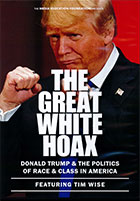
The Great White Hoax: Donald Trump & The Politics of Race and Class in America 2018
Distributed by Media Education Foundation, 60 Masonic St., Northampton, MA 01060; 800-897-0089
Directed by Jeremy Earp
DVD , color, 71 min.
High School - General Adult
Sociology, White Privilege, Critical Race Theory, Intersectionality, Neo-Marxism
Date Entered: 10/05/2018
Reviewed by Timothy W. Kneeland, History and Political Science Department, Nazareth College of Rochester, Rochester, NYThis documentary is about The Great White Hoax, the distraction of Americans from creating an economically and socially just society by promoting a racist and white empowerment mentality among middle and working class white Americans. The election of Donald Trump and his speeches disparaging women and people of color is the most recent example of this effort, which can be traced back to colonial America. The effort openly flourished after the Civil War but stumbled during the civil rights era, thus forcing modern conservatives to switch to coded language used to demonize people of color. Such words as “welfare” and “law and order” are used to depict non-white actors in the United States as the enemy of white privilege and status. The bulk of the film explains the rise and power of Donald Trump whose “Make America Great Again” slogan resonates with white voters who understand it as a means to “take our country back.” They do not always specify whom they want to take the country back from, but it is clear from their comments that they are part of a reactionary attempt to return to the pre-civil rights era of Jim Crow and anti-feminism.
The Great White Hoax is centered on the work of Tim Wise, whose anti-racist philosophy was formed at the People’s Institute for Survival and Beyond. Wise narrates and analyzes the situation both historical and contemporary, and his comments are bookended by video clips and newspaper headlines from the internet.
Historians who have read Howard Zinn’s A People’s History of the United States (2017) will be familiar with the comments which reflects a neo-Marxist interpretation of history. This is the strength of the film which is structured on those ideas. It is also the main weakness, since it requires that historical events be shoehorned to fit into the theory, as opposed to having the past shape the theory. Nonetheless, it is an excellent introduction to the topic and should generate rich debate in the classroom and beyond.